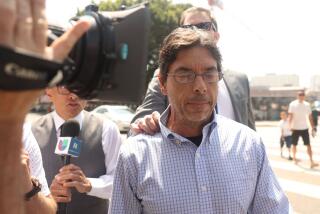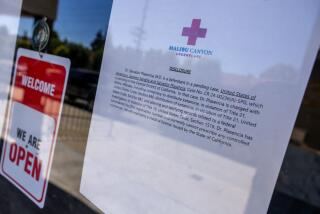Physician Gets 4 Years in Cancer ‘Potion’ Sales
- Share via
A Colton physician who sold cancer patients a substance that was 99.4% water was ordered Thursday to serve a four-year prison term, but the judge said he might reduce the sentence if the defendant turns in his medical license.
Dr. Bruce W. Halstead, 65, was convicted Oct. 3 of 24 counts of cancer fraud and grand theft for selling the potion ADS to 10 patients for $125 to $150 a liter. In addition to water, ADS contains a brownish sludge made up primarily of coliform bacteria, according to testimony during the 5-month-long trial.
In imposing sentence Thursday, Compton Superior Court Judge Marvin D. Rowen gave Halstead the opportunity to cut short his prison term by dropping all his medical activities, medical research and the title of “doctor.”
Rowen ordered Halstead, who remains free on $100,000 bail, to come back to court on June 27 to show proof that he has relinquished his license to practice and either sold his clinic in Loma Linda or closed it down. The judge also fined him $10,000.
Deputy Dist. Atty. Hyatt Seligman, who had sought a six-year prison term, described the sentence as “fair.”
“My main goal was to protect society from (him) and to prevent other frauds from exploiting people with chronic diseases,” the prosecutor said after the court proceeding. “This sends a message to anyone who wants to practice this kind of chicanery.”
At a daylong hearing Wednesday, Purcell Daniels, the deputy probation officer who interviewed Halstead, said the physician should go to prison, because he showed no remorse for what he had done.
“The only remorse he showed was for the fact that he had been convicted,” Daniels testified, adding at another point, “I believe that he was motivated by a desire to make money.”
Halstead, while tearfully telling the judge he was “deeply sorry” for what he described as a “disgraceful situation,” declared in a broken voice, “I never once considered the issue of money.
“My entire history has been one of dedication . . . to trying to save lives,” he continued. “I do have remorse. But I believed then and I believe now that what I did was in the best interests of my patients.”
Serving as his own attorney during his trial, Halstead testified that he did not know the exact content of ADS (which does not stand for anything in particular) but viewed it as a nutritional supplement that would benefit his patients. He said his case demonstrated that the medical establishment does not want to let people with severe or terminal illnesses choose their own treatment.
The prosecution contended that ADS could be harmful because it contained the same bacteria found in human feces. However, prosecutors never established that any of Halstead’s patients were hurt by the substance, Seligman said.
In the probation report he filed with the court, Daniels noted that the defense had supplied him with 500 pages of character references from Halstead’s friends, employees, patients, family members, co-workers and fellow doctors. These people “describe him as a brilliant and dedicated scientist and doctor,” Daniels wrote.
Under questioning from Judd C. Iversen, who is now representing Halstead, the probation officer testified that while he believed that the testimonials were sincere, he doubted that the letter-writers had “intimate knowledge” of what the doctor was up to.
Halstead was one of six people charged in connection with ADS in February, 1984, after an investigation prompted by a complaint from a Chatsworth minister who eventually died of leukemia.
Alfred M. Dix of Marina del Rey pleaded guilty to charges of furnishing an unlawful cancer drug and Robert A. Sanford of Chatsworth pleaded no contest to unlawfully selling a cancer treatment. Both were sentenced to probation.
Gary D. Middleton, who sold ADS to Halstead; Kazuo Yamagishi, the purported inventor of the substance, and another defendant, Alfonso Faba, remain at large.
More to Read
Sign up for Essential California
The most important California stories and recommendations in your inbox every morning.
You may occasionally receive promotional content from the Los Angeles Times.










